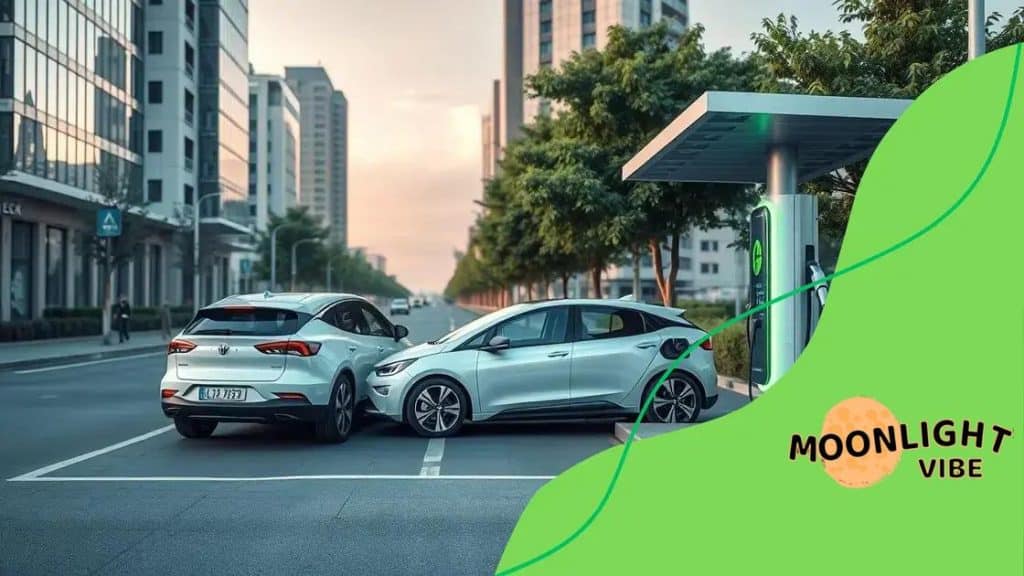The rise of electric vehicles and their impact on transportation

Anúncios
The rise of electric vehicles is transforming transportation by reducing emissions, lowering operating costs, and integrating with smart city infrastructure for a more sustainable future.
The rise of electric vehicles is changing the way we think about transportation. Have you ever imagined a world with less pollution and quieter streets? Let’s dive into this shift.
Anúncios
Understanding electric vehicles
Understanding electric vehicles is essential in today’s world. They represent a significant shift in how we think about transportation. With advancements in technology, these vehicles have gained popularity, and many people are curious about their features and benefits.
What are electric vehicles?
Electric vehicles (EVs) are cars that run entirely on electricity, rather than gasoline or diesel. They use electric motors and batteries to drive, which means they emit no tailpipe pollutants. This is a major advantage for the environment.
How do they work?
Electric vehicles operate using a battery that stores electricity. When the car is in use, the electric motor draws power from the battery to move the vehicle. Charging can be done at home, at work, or at public charging stations. The ease of charging has improved, making it a practical option for many drivers.
Anúncios
- Electric vehicles are often quieter than traditional cars.
- They can accelerate quickly due to the instant torque from electric motors.
- Many EVs come with advanced technology features, enhancing the driving experience.
- Operating costs are typically lower compared to gasoline vehicles.
As more consumers recognize the benefits of electric vehicles, like reduced fuel costs and maintenance, interest in adopting EVs grows. Additionally, there are government incentives available to encourage people to make the switch.
In recent years, various manufacturers have started to produce electric vehicle models that cater to different needs, showing that EVs are becoming mainstream. With more charging infrastructure being built, concerns about range are lessening, making them more appealing for long trips.
Ultimately, understanding the basics of electric vehicles helps consumers make informed decisions about their transportation choices. As technology continues to evolve, the future of transportation looks greener and more sustainable.
Benefits of electric vehicles for consumers
The benefits of electric vehicles for consumers are becoming more evident as these cars gain popularity. Many people are recognizing that switching to an EV can lead to significant advantages.
Cost savings
One of the main benefits is cost savings. Electric vehicles typically have lower operating costs compared to traditional gas-powered cars. Charging an EV is generally cheaper than buying gasoline.
Environmental impact
Another major advantage is the positive impact on the environment. Electric vehicles produce zero tailpipe emissions, which contributes to cleaner air. This is especially important in urban areas where air quality is often poor.
- Reduced carbon footprint.
- Less noise pollution.
- Help in combating climate change.
In addition to financial and environmental benefits, many consumers enjoy the enhanced driving experience of electric vehicles. They offer smooth acceleration, quiet operation, and often come packed with the latest technology and features.
Moreover, the convenience of charging at home is a significant advantage. Owning an electric vehicle means you can start each day with a full battery, bypassing trips to the gas station. With the expansion of charging infrastructure, it’s becoming easier to find a charging station while traveling.
Overall, as more consumers become aware of the advantages of electric vehicles, the transition to these greener options continues to grow. They provide practical benefits, along with the opportunity to make environmentally friendly choices.
The environmental impact of electric vehicles

The environmental impact of electric vehicles is a critical aspect of their growing popularity. Many people choose EVs to make a positive difference in our world.
Reduction of greenhouse gases
One of the main advantages is their potential to lower greenhouse gas emissions. Traditional gasoline vehicles release carbon dioxide (CO2) and other harmful pollutants into the air. On the other hand, electric vehicles have zero tailpipe emissions, which greatly helps improve air quality.
Impact on energy consumption
Electric vehicles use energy more efficiently than gasoline vehicles. The electric motor converts over 77% of the electrical energy from the grid to power at the wheels. In comparison, gasoline vehicles only convert about 12% to 30% of the energy in gasoline to power at the wheels.
- Electric vehicles can help decrease urban smog.
- They contribute to reduced noise pollution, creating quieter cities.
- Using renewable energy for charging can maximize environmental benefits.
Furthermore, as more individuals adopt electric vehicles, demand for fossil fuels decreases. This shift can lead to less oil extraction and lower risks of oil spills and other environmental disasters.
Some concerns do arise, such as the environmental impact of lithium-ion batteries used in EVs. However, many manufacturers are exploring ways to recycle these materials to minimize waste. Innovations in battery technology continue to evolve, focusing on sustainability and efficiency.
Overall, the widespread use of electric vehicles offers a powerful solution to tackle pressing environmental issues. By reducing emissions, improving energy efficiency, and promoting cleaner air, EVs play a vital role in creating a healthier planet.
Challenges in adopting electric vehicles
Adopting electric vehicles comes with several challenges that consumers and manufacturers face. Understanding these hurdles is essential for a successful transition to cleaner transportation.
Charging infrastructure
One significant challenge is the availability of charging stations. In many areas, there are not enough charging points to support a widespread shift to EVs. This can create anxiety for drivers, especially on long trips.
Initial costs
The upfront cost of purchasing an electric vehicle can be higher than that of traditional gas cars. While prices are dropping, many buyers may still be deterred by the initial investment. However, it’s crucial to factor in potential savings on fuel and maintenance over time.
- Installation costs for home charging systems can be high.
- Battery replacement can be expensive.
- Limited availability of affordable EV models in some markets.
The perception of electric vehicles not being practical for daily use also poses a challenge. Some drivers worry about the range of EVs—how far they can go on a single charge. It’s important to keep in mind that advances in battery technology are continually improving range, making them more suitable for a variety of needs.
Additionally, the environmental impact of battery production and disposal also raises concerns. Extracting materials like lithium can have negative effects on the environment. As the demand for electric vehicles increases, manufacturers are exploring more sustainable practices to mitigate these impacts.
Overall, while the transition to electric vehicles presents challenges, understanding and addressing these issues is essential for a cleaner and more sustainable future in transportation.
The future of transportation with electric vehicles
The future of transportation with electric vehicles looks promising and innovative. Many experts believe that as technology advances, these vehicles will shape how we travel in our cities and beyond.
Technological advancements
New technologies are constantly emerging to enhance the performance and efficiency of electric vehicles. As battery technology improves, we can expect longer ranges and shorter charging times. This will make EVs even more convenient for everyday use.
Integration with smart cities
As our cities become smarter, electric vehicles will play a vital role. They can be integrated with smart city infrastructure, including charging stations that communicate with vehicles to provide real-time information on availability. This will make using an EV more efficient and user-friendly.
- Increased use of renewable energy sources for charging.
- Development of autonomous electric vehicles.
- Improved traffic management systems that prioritize EVs.
Moreover, public transportation systems are starting to adopt electric vehicles as well. City buses and trains powered by electricity can minimize emissions and reduce urban congestion. This shift is important for creating cleaner and healthier urban environments.
Consumer interest in sustainability also drives the growth of electric vehicles. As more people look to reduce their carbon footprints, the market for EVs is expected to expand significantly. Companies are responding to this demand by producing a wider variety of models, making EVs accessible to more consumers.
In summary, the future of transportation with electric vehicles promises to be more sustainable, efficient, and integrated with our daily lives. With ongoing innovations and a growing focus on environmental responsibility, EVs are set to change the landscape of transportation.
FAQ – Frequently Asked Questions about Electric Vehicles
What are the main benefits of electric vehicles?
Electric vehicles offer lower emissions, reduced fuel costs, and less maintenance compared to traditional gas-powered cars.
How long does it take to charge an electric vehicle?
Charging times can vary, but many EVs can be charged in a few hours at home. Fast chargers can provide an 80% charge in around 30 minutes.
What should I know about the charging infrastructure for electric vehicles?
While it is improving, the availability of charging stations can vary by location. It’s essential to plan charging points for longer trips.
Are electric vehicles cost-effective in the long run?
Yes, although they can have a higher initial cost, electric vehicles often lead to savings on fuel and maintenance over time.





